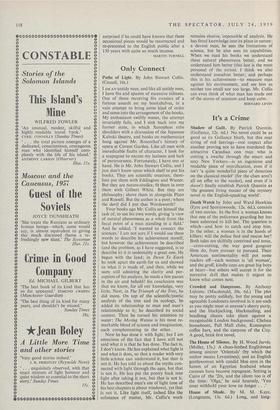Only Connect
I AM AN untidy man, and like all untidy men, I have fits and spasms of excessive tidiness. One of those recurring fits consists of a furious assault on my bookshelves, in a vain attempt to bring some kind of order and sense into the arrangement of the books. My enthusiasm swiftly wanes, the attempt invariably fails, and I sink back into my former state, in which Xenophon rubs shoulders with a discussion of the Japanese Kabuki theatre, and books on mathematics bang against Mr. Rosenthal's history of opera at Covent Garden. Like all men with ineradicable faults of character, I look for a scapegoat to excuse my laziness and lack of perseverance. Fortunately, I have one at hand. He is Mr. John Stewart Collis, and I just don't know upon which shelf to put his books. They are scientific treatises; there- fore put them with Eddington and Wiener. But they are nature-studies; fit them in over there with Gilbert White. But they are philosophy; shove them in alongside Plato and Russell. But the author is a poet; where the devil did I put that Wordsworth?
Four books ago Mr. Collis set himself the task of, to use his own words, giving 'a view of natural phenomena as a whole from the focal point of a man standing in a field.' And he added, 'I wanted to connect the sciences.' I am not sure if I would use these words to describe his achievement myself, but however the achievement be described (and the problem, as I have suggested, is to describe it) it is undeniably a great one. He began with the land; in Down To Earth he took apart the earth for us and showed us what it is made of, and then, while we were still admiring the clarity and per- ception of his analysis, he made a few passes in the air and behold! his conclusion was that we know, for all our knowledge, very little. Next, in The Triumph of the Tree, he did more. On top of the scientific/poetic analysis of the tree and its ecology, he added its relationship to man and man's relationship to it; he described its social context. Then he turned his attention to water; The Moving Waters is his most re- markable blend of science and imagination, each complementing to the other.
Now he has done it with light; but I am conscious of the fact that I have still not said what it is that he has done. The fact is, I don't know. He has explained what light is and what it does, so that a reader with very little science can understand it, but that is not it. He has told us about the myths con- nected with light through the ages, but that is not it. He has put the poetry back into light after taking it out, but that is not it. He has described man's use of light (one of his best chapters is about windows), yet that is not it. Like light itself, indeed like the substance of matter, Mr. Collis's work remains elusive, impossible of analysis. He has fitted knowledge into its place in nature; a devout man, he sees the limitations of science, but he also sees its capabilities. When we read his books we understand these natural phenomena better, and we understand him better (this last is the most personal of the series). I think we also understand ourselves better; and perhaps this is his achievement—to measure man against his environment, and see him as neither too small nor too large. Mr. Collis can even think of what man has made out of the atoms of uranium and keep calm.
BERNARD LEVIN






































 Previous page
Previous page